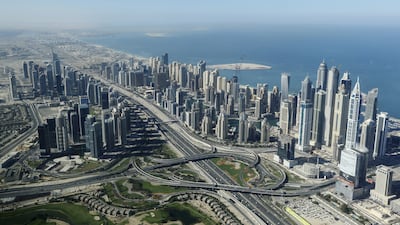The number of completed property deals in Dubai has tumbled by more than two-thirds, according to JLL.
In its Dubai Q2 Market Report, the firm’s Mena head of research Craig Plumb said Dubai Land Department figures show a 69 per cent drop in residential transactions during the first half of the year, with 7,400 deals completed, compared to 23,800 in the same period last year.
The aggregate value of sales also dropped by 66 per cent to Dh12.7bn. Prices per unit, on the other hand, only dropped by 8 per cent year-on-year.
“This single-digit price correction is in sharp contrast to declines we witnessed in 2008-09 and is a clear indication that the market is maturing,” said Mr Plumb.
Despite this, JLL expects further declines in both the number and the prices of homes sold during the second half of the year.
Rents remained flat during the quarter, but are expected to come under pressure from an anticipated increase in supply.
Indeed, a wave of new off-plan properties were launched in Dubai during the second quarter of 2015, contributing to the decline in the number of homes sold in the secondary market, according to a new Cavendish Maxwell report.
The agency said that 7,900 units were released during the quarter across 19 projects.
The bulk of these are “affordable” properties – apartments (82 per cent) and town houses (17 per cent) in secondary locations such as Dubai Silicon Oasis and Dubai World Central.
A similar glut of properties came on to the market in 2008 ahead of the last market crash, but Cavendish Maxwell said that current conditions are not comparable.
The fact that most new projects contain affordable units with flexible payment plans, make them appealing to a wider spectrum of end-users and investors, it said.
“The financial scars of the last market crash run deep for the people that lived through it and are still here,” said managing partner Jay Grant. “That demographic is very cautious and whereas off-plan properties flew off the shelves in 2007-08, it’s less impulsive this time. That’s not to say that people won’t get caught out, but it’s a more considered market.”
Faisal Durrani, international research and business development manager at Cluttons, said that according to his firm’s analysis, some 40,120 new units have been announced so far in 2015 – about half of which are in Nshama’s Town Square. A further 4,000 were announced by Nakheel at the former Dubai Waterfront site in Jebel Ali in January.
Mr Durrani argued that the short-term impact of such announcements would be limited, as it will take about 10 years before Town Square is fully developed.
“Developers have learnt from the past and are carrying out these projects in phases. A lot of the announcements are from state-owned developers, who have no inclination to rush them to market,” he said.
He added that the historic average population growth for Dubai has been around 7 per cent, but even if a lower rate of 5 per cent growth occurred between now and 2020, it would mean a population increase of 400,000.
“If you look at the pipeline and the projected population growth, they are quite easily matched.”
mfahy@thenational.ae
Follow The National's Business section on Twitter


